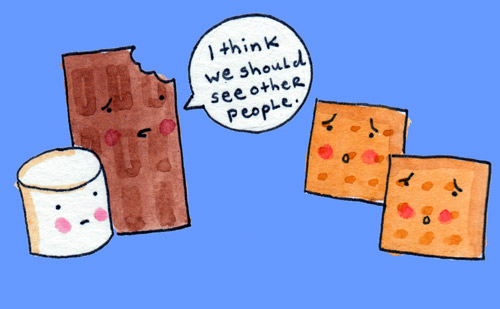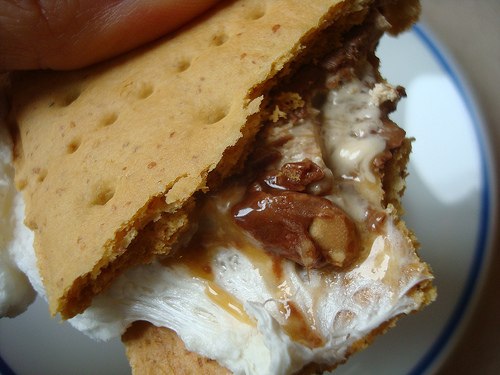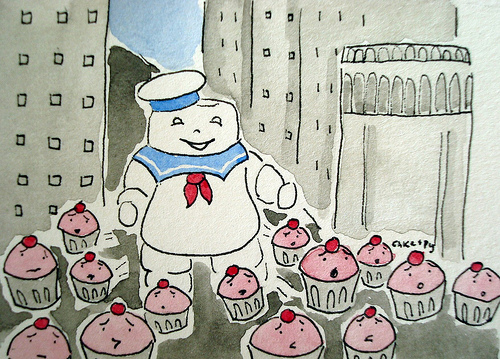 Is this how the S'moreo was born?Today, while eating a delicious s'more, I found myself thinking that if I could go back in time, at that moment my destination would be to visit the person who invented the s'more so I could thank them. With emotion and enthusiasm.
Is this how the S'moreo was born?Today, while eating a delicious s'more, I found myself thinking that if I could go back in time, at that moment my destination would be to visit the person who invented the s'more so I could thank them. With emotion and enthusiasm.
It was with deep sadness that I realized I would not know who that person was, so I hit the books to find out more about this sweet treat.
 This s'more was made using a portion of Snickers Bar.The name seems self-explanitory enough: a slurring of "Gimme some more" would naturally become S'more. Why did it settle on this particular sweet treat? No idea, but I have the thought that it is like a nickname: this one just stuck.
This s'more was made using a portion of Snickers Bar.The name seems self-explanitory enough: a slurring of "Gimme some more" would naturally become S'more. Why did it settle on this particular sweet treat? No idea, but I have the thought that it is like a nickname: this one just stuck.
As for who invented it? As What's Cooking America advises,
No one is really sure who invented S'mores, because the recipe has basically been passed around by word of mouth since then. The first known recipe appeared in the 1927 Girl Scout hand book called Tramping and Trailing with the Girl Scouts.
The recipe is credited to Loretta Scott Crew, so happily I would at least have a person to go back in time and thank, because while she probably didn't invent the confection, hers is the first known published recipe for the delicious triple-threat of graham cracker, marshmallow, and chocolate.
So how did this trinity of awesome come together?
What seems pretty reasonable (to me, anyway) is that what really kept this treat going was the producers of the products. Concurrently, marshmallows were becoming commercially available for the first time; Graham crackers had gained much popularity after their invention by Sylvester Graham (described as "a New England health advocate with a passion for temperance and fiber"), and the recipe had been picked up and gained popularity (as well as evolving into a sweeter, more cookielike cracker) after being mass-produced by Nabisco. I must make a side note to wonder "What would Sylvester Graham think of S'mores?". Somehow I don't think it's what he envisioned his legacy to be. Sta-Puft could make so many S'mores.
Sta-Puft could make so many S'mores.
But I digress. My theory about products coming together in the right place at the right time is supported by an article on Slashfood, which also brings up an interesting point on other popular confections which debuted in the same era:
The true origin of the snack is unknown, as camping recipes tended to be passed from person to person and family to family - often over the campfire itself. The first recipe for s'mores was published in 1927 in the Girl Scout Handbook and the event marked the official introduction of the s'more into popular culture.
The publication of the s'more recipe was not the first pairing of chocolate, marshmallow and cookies. In 1913, the Mallomar cookie was introduced to market, followed in 1917 by the Moon Pie. Both products have a graham cracker-like base - a sandwich, in the case of the Moon Pie - and are topped with marshmallow and a layer of chocolate.
so, maybe it was a Girl Scout reaction to popular treats around the time, which themselves were the result of these new products?
As for their enduring popularity? As Liesl Schillinger (a documented s'more hater) says,
they're easy-to-make, guaranteed nostalgia-inducers, well within the reach of any parent's budget. Others may disagree, but I suspect that most us don't eat them for the taste. We eat them to relive our first s'mores experience, back when our taste buds were so rosy new that any sugar was ecstasy; back when our parents were the age we are now … and younger. S'mores take us back in time. You don't have to like them to love them.
Well put.
Want s'more? You may enjoy:
- Peeps S'mores Pie
- S'moreos (featured in CakeSpy Presents Sweet Treats for a Sugar-Filled Life
)
- S'more Brownies
- S'more Pop-Tart S'mores
- S'more Pop-tart drop cookies
- S'more Gelato Sandwiches
